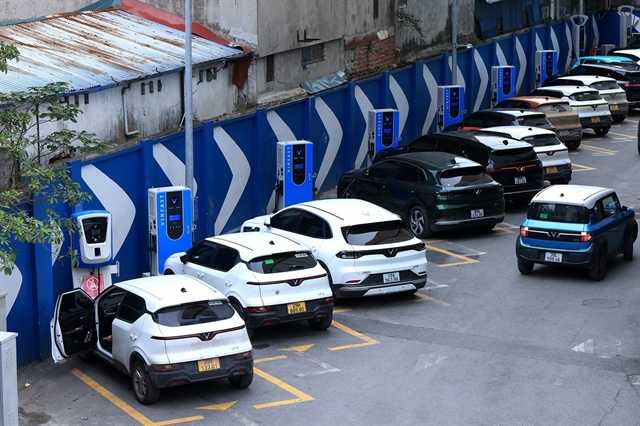Hà Nội is accelerating its green transport drive by piloting charging stations at key bus terminals and mapping hundreds of potential sites across the city as it aims to phase out petrol-powered vehicles in favour of cleaner alternatives by 2030.

An electric car charging station on Hà Nội's Phạm Ngọc Thạch Street. — VNA/VNS Photo
Charging stations are already operating at Giáp Bát and Gia Lâm bus stations, with Mỹ Đình station set to follow later this year.
Surveys by the Department of Construction have identified nearly 500 possible sites for further stations, including bus depots, railway stations, apartment complexes, urban areas and public parks.
Within Ring Road No.1 alone, nine wards have proposed 115 suitable locations, such as pavements, public land, schools, offices and small green spaces like Phùng Hưng and Cổ Tân gardens. Outside the ring, local authorities have suggested 386 potential sites, though more than half of communes and wards have yet to submit proposals.
The Bus Station Joint Stock Company has installed 40 charging points at Giáp Bát, 34 at Gia Lâm and plans 20 at Mỹ Đình. The Department of Construction has also earmarked 19 spots in underground parking lots and public parks, while three of Hà Nội’s five bus transfer points could host charging stations for electric buses.
Across the bus network, 122 terminal points could eventually be equipped with charging facilities depending on demand. The Housing Management Centre has mapped out 81 car charging points and 105 motorbike charging spots at resettlement apartments, student dormitories, social housing and inter-agency complexes.
Many companies have tabled investment plans, including TMT Motors with a pilot of 500 public charging points, Vinhomes Riverside with 1,040 stations linked to parking and green space, and V-Green with 106 stations at on-street parking sites.
Some companies are experimenting with models that combine charging hubs with commercial services or trialling battery-swapping stations to expand convenience.
The Department of Construction is drafting a six-month plan to steer the transition from fossil fuel to clean energy vehicles under a prime ministerial directive. It focuses on policies to support households and businesses, expand electric bus and minibus networks and encourage non-motorised transport within Ring Road No.3.
By 2030, the city aims to ensure all buses and taxis run on electricity or green energy. Incentives for manufacturers and policies to help households switch from petrol to electric vehicles are being finalised for submission to the City People’s Council later this year.
Beyond cars, Hà Nội is also considering public bike and e-motorbike sharing schemes, piloting battery-swapping stations and gradually phasing out petrol-powered private vehicles.
Several projects are expected to help ease congestion and pollution while driving forward the trend of green and smart transport.